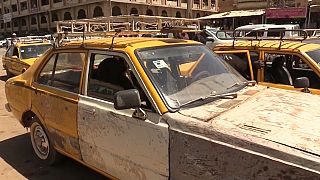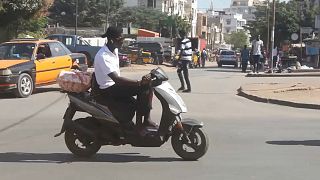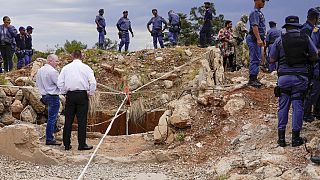South Africa
One week after minibus taxi drivers called a strike in Cape Town, repercussions are still being felt.
Various supermarkets in South Africa's second largest city have empty shelves as deliveries of food have been disrupted with multiple roads blocked and many have struggled to get to work.
Taxi is the main mode of transport for millions of working-class citizens.
"I know soup kitchens that help other people in terms of giving them their lunch or supper, they are closed today, Alfred Magwaca, a community activist and tour guide says.
"Even not today in fact since the strike started. Because they could not go out to get groceries, at the same time they did not even want to risk people coming to cook whatever they had left."
The protests began last Thursday after minibus taxi drivers called a weeklong strike in response to what they said were heavy-handed tactics by police and city authorities in impounding some of their vehicles. The national union that oversees the minibus taxi industry say their drivers are being unfairly targeted by authorities for minor offenses, such as drivers not wearing safety belts.
City officials say many of the minibus taxis are not roadworthy and are a danger to other motorists. Minibus taxis have a reputation in South Africa for sometimes ignoring road rules amid pressure to quickly deliver passengers and maximize their profits, but they are critical in getting millions to work and school.
Officials from the minibus tax union deny their members are instigating the violence.
According to local reports, the South African National Taxi Council called off its provincial stayaway following negotiations with the local government.
"If the taxi strike can end, everything can be alright", a factory machine operator says.
"We are getting hungry now. The money is finished at the bank. We don’t know what to do. There’s no food , the Somalian shops are closed. There’s no bread, there’s no milk, there’s no eggs."
If the violence in Cape Town appears to have eased, the dispute between the drivers and city authorities flared protests in which 5 people were killed including a British national.
Deadly protest
The 40-year-old man was sitting in the passenger seat of the vehicle when he was shot in the head, South African police said. Two other passengers and an infant were also in the vehicle. The passengers were taken to a hospital for medical treatment, police said.
South African police said they opened a murder case over the shooting, which happened last week in the Nyanga township near the Cape Town International Airport and was confirmed by police on Thursday (Aug. 10).
The strike has had a negative impact on Cape Town and underlines how South Africa relies on minibus taxis as its No. 1 mode of public transport.
Nearly half a million children missed school this week in Cape Town and the larger Western Cape province because of the strike, and tens of thousands of teachers and others have been unable to get to work, causing many businesses to close or reduce their services because of a lack of staff.
Critical services like hospitals have been affected and there are concerns over diminishing food supplies in grocery stores because of the impact of the violence, which is hampering the movement of delivery trucks.
Studies estimate that nearly 70% of South African households rely on minibus taxis to get to school or work, a statistic that is also testament to the poor state of traditional modes of public transport like rail and city buses in Africa's most developed economy.













02:18
Highly-anticipated Wicked makes its cinema debut in South Africa
01:00
Chidimma Adetshina crowned Miss Universe Africa and Oceania
01:10
South African beauty queen withdraws from Miss Universe pageant
01:38
Police spokesperson calls rescue attempt of trapped miners ‘unsafe’
00:45
What next for Safa president Danny Jordaan?
01:37
South Africa's refurbished Digital Dome set to open in February 2025